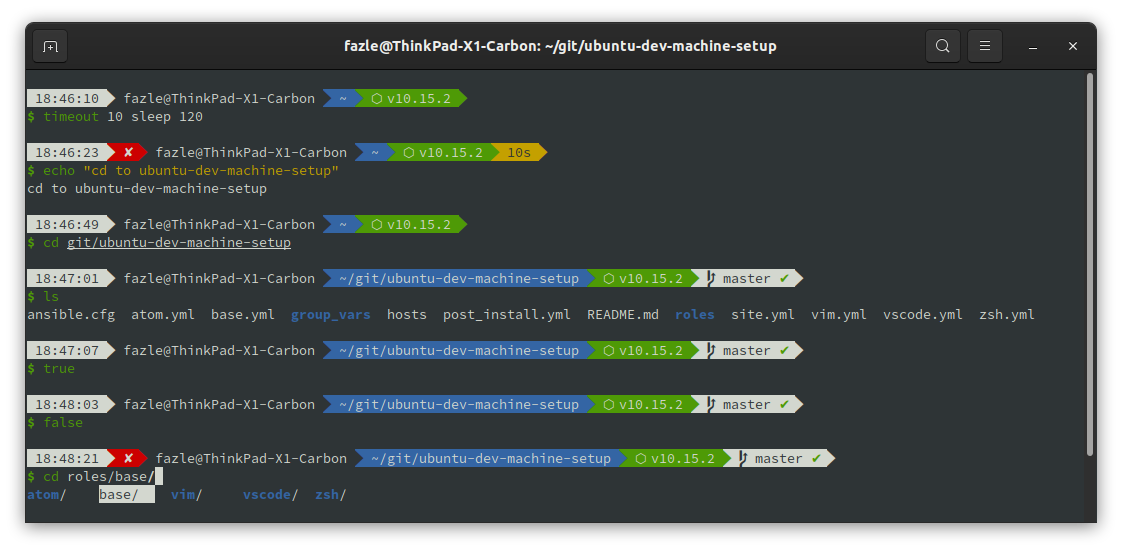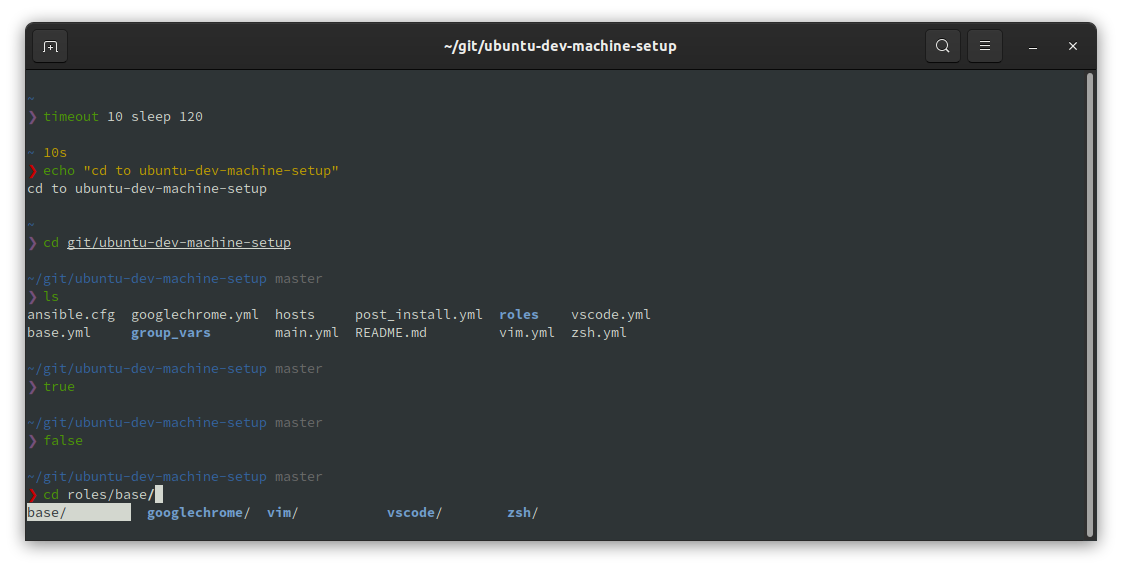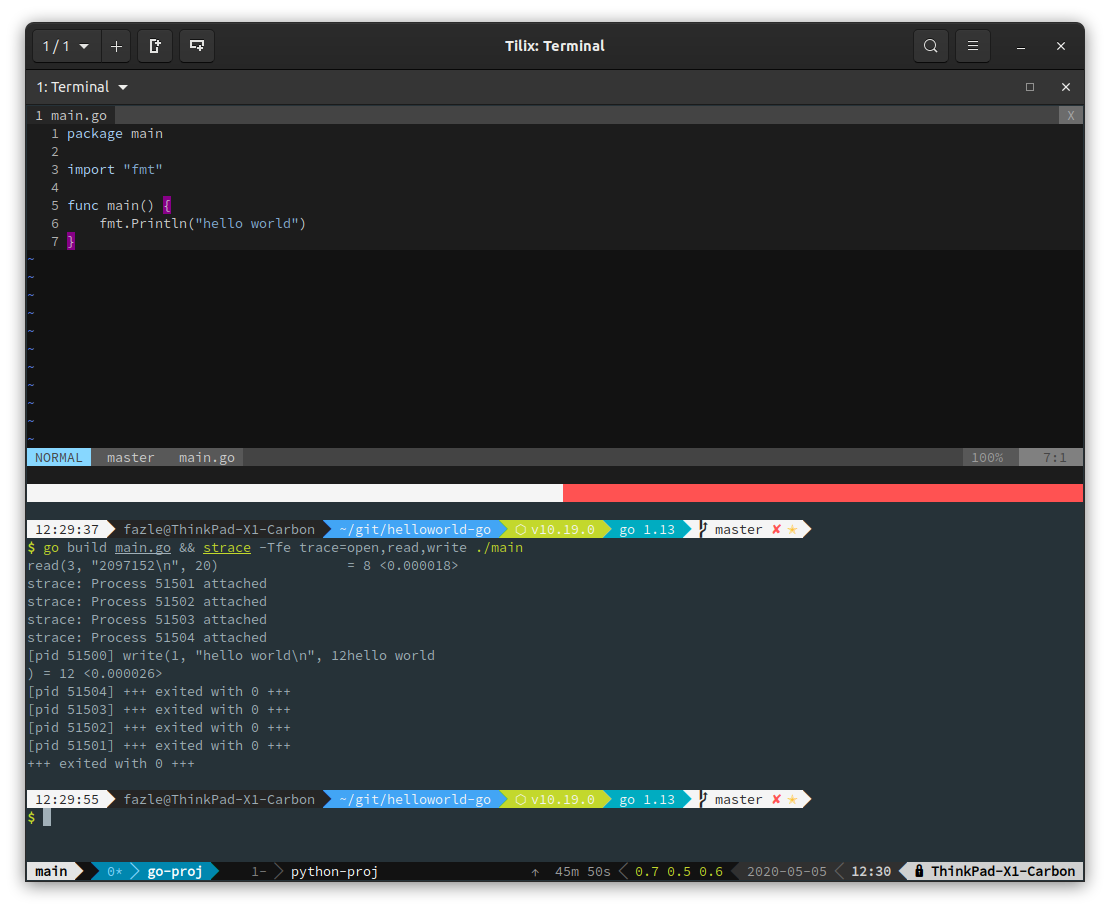ubuntu-dev-machine-setup | Ubuntu 20.04 LTS
This repo contains Ansible playbooks to configure your system as a development machine upon a clean install.
The playbooks should run in Debian based system but was only tested with:
- Ubuntu 20.04
- Ubuntu Budgie 20.04
For other versions of Ubuntu, change to the other branches of this git repo.
Screenshot above is using bullet-train zsh theme
Screenshot above is using pure zsh theme
Screenshot above is using bullet-train zsh theme with tmux
Pre-requisites
On the system which you are going to setup using Ansible, perform these steps.
You need to install ansible and git before running the playbooks. You can either install it using pip or apt.
sudo apt install ansible git
And clone this repo
git clone https://github.com/fazlearefin/ubuntu-dev-machine-setup.git
cd ubuntu-dev-machine-setup
Running the playbooks to configure your system
Invoke the following as yourself, the primary user of the system. Do not run as root.
ansible-playbook main.yml -e "{ laptop_mode: True }" -e "{ virtual_machine_mode: False }" -e "local_username=$(id -un)" -K
Enter the sudo password when asked for BECOME password:.
The main.yml playbook will take anything from 15 minutes to an hour to complete.
After all is done, give your laptop a new life by rebooting.
What is this laptop_mode?
Setting this to True
- will install some packages like TLP for battery economy
- will not install and configure ssh server
Setting this to False
- will not install some packages like
powertopfor battery economy - will install and configure ssh server
What is this virtual_machine_mode?
This is to tell if you are configuring Ubuntu on a virtual machine.
Setting this to True
- will not install docker, virtualbox and vagrant
What gets installed and cofigured?
I am a Linux Systems Engineer and my daily job include working with various config management using Ansible. So if you are in a similar profession the installed system will suit your needs. It is also easy to extend using Ansible roles.
Summary of packages that get installed and configured:
- Archiving tools like zip, rar, etc
- Customization tools like gnome-tweak-tool, etc
- Power management tools like TLP
- Download utils like aria2, wget, axel, etc
- Developer tools like awscli, httpie, clusterssh, docker, vagrant, virtualbox, ghostwriter markdown editor, etc
- Google Chrome
- Visual Studio Code and some popular extensions
- Git Bash Prompt
- ssh server
- zsh shell, antigen plugin manager, oh-my-zsh plugins
- remmina to connect to Windows over RDP (and also transfer files between your Linux machine and remote Windows host)
- Nerd Fonts
- Reduce swappiness for better perfomance
- Mount
/tmpon tmpfs - Enable ufw firewall and configure for incoming ssh
- Install amix/vimrc Vim Distribution
- Generate a
.zshrcto enjoy zsh right away- Enable
oh-my-zshand some bundled plugins - Enable bullet-train zsh theme
- Function to stop ssh-agent from asking for encrypted ssh key password repeatedly when launching new terminal
- Enable
- Sample
.tmux.conffile with powerline status bar and mouse support! (Open Tilix terminal and runtmuxcommand, or enable custom command option in Tilix) torandproxychains4for anonymous browsing. Visit my blog post to see how to use itclamavantivirus package to manually scan files for malicious code using theclamscanutility. The clamav daemon for real-time scanning is not installed for performance reasons
Known Issues
- If the ansible playbook halts after completing a few tasks, simply run the playbook again. Since most of the tasks are idempotent, running the playbook multiple times won't break anything.
- If your terminal shows any weird characters because of installing one of the zsh themes, simply change the font to a suitable Nerd Font from the terminal's settings.
Pull Requests and Forks
You are more than welcome to send any pull requests. However, the intention of this repo is to suit my development needs. So it might be better if you fork this repo instead for your own needs and personalization.
Donations
Bitcoin (BTC): 38uvDLV4GzcAB7qMUEM5chqivESqNPWPZW
Ethereum (ETH): 0xb87A10e8e3fa4Ea71b478f8f0c8798977dBe28Ed
Litecoin (LTC):MRAwH2WHUprCn5RcpKWKMkfaUJicTpsbWr or 3Jxny96KXhzmya9iiSWyY7RB9c8AXRGN3n


